| Listing 1 - 10 of 12 | << page >> |
Sort by
|
Book
ISBN: 9780521192491 0521192498 9780511761362 9781107619678 9780511918575 0511918577 0511761368 9786612818745 6612818743 9780511917592 0511917597 0511913001 9780511913006 110761967X 1107214009 1107384478 1282818740 0511916612 0511914806 Year: 2010 Publisher: Cambridge : Cambridge University Press,
Abstract | Keywords | Export | Availability | Bookmark
 Loading...
Loading...Choose an application
- Reference Manager
- EndNote
- RefWorks (Direct export to RefWorks)
We live in a new age for statistical inference, where modern scientific technology such as microarrays and fMRI machines routinely produce thousands and sometimes millions of parallel data sets, each with its own estimation or testing problem. Doing thousands of problems at once is more than repeated application of classical methods. Taking an empirical Bayes approach, Bradley Efron, inventor of the bootstrap, shows how information accrues across problems in a way that combines Bayesian and frequentist ideas. Estimation, testing and prediction blend in this framework, producing opportunities for new methodologies of increased power. New difficulties also arise, easily leading to flawed inferences. This book takes a careful look at both the promise and pitfalls of large-scale statistical inference, with particular attention to false discovery rates, the most successful of the new statistical techniques. Emphasis is on the inferential ideas underlying technical developments, illustrated using a large number of real examples.
Bayesian statistical decision theory. --- 519.2 --- 519.2 Probability. Mathematical statistics --- Probability. Mathematical statistics --- Bayes' solution --- Bayesian analysis --- Statistical decision --- Bayesian statistical decision theory --- Statistique bayésienne --- Mathematical statistics. --- Mathematics --- Statistical inference --- Statistics, Mathematical --- Statistics --- Probabilities --- Sampling (Statistics) --- Statistical methods
Book
ISBN: 9780123704764 0123704766 9786612168420 1282168428 0080919367 9780080919362 9781282168428 6612168420 Year: 2009 Publisher: Amsterdam ; Boston : Morgan Kaufmann Publishers,
Abstract | Keywords | Export | Availability | Bookmark
 Loading...
Loading...Choose an application
- Reference Manager
- EndNote
- RefWorks (Direct export to RefWorks)
The Bayesian network is one of the most important architectures for representing and reasoning with multivariate probability distributions. When used in conjunction with specialized informatics, possibilities of real-world applications are achieved. Probabilistic Methods for BioInformatics explains the application of probability and statistics, in particular Bayesian networks, to genetics. This book provides background material on probability, statistics, and genetics, and then moves on to discuss Bayesian networks and applications to bioinformatics. Rather than getting bogged down
Mathematical statistics --- Probability theory --- Biomathematics. Biometry. Biostatistics --- Molecular biology --- Bioinformatics. --- Bayesian statistical decision theory. --- Probabilities. --- Probability --- Statistical inference --- Combinations --- Mathematics --- Chance --- Least squares --- Risk --- Bayes' solution --- Bayesian analysis --- Statistical decision --- Bio-informatics --- Biological informatics --- Biology --- Information science --- Computational biology --- Systems biology --- Data processing --- Bioinformatics --- Bayesian statistical decision theory --- Probabilities --- Bio-informatique --- Statistique bayésienne --- Probabilités
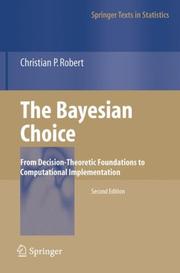
ISBN: 9780387715988 0387715991 0387715983 Year: 2007 Publisher: New York : Springer,
Abstract | Keywords | Export | Availability | Bookmark
 Loading...
Loading...Choose an application
- Reference Manager
- EndNote
- RefWorks (Direct export to RefWorks)
Winner of the 2004 DeGroot Prize This paperback edition, a reprint of the 2001 edition, is a graduate-level textbook that introduces Bayesian statistics and decision theory. It covers both the basic ideas of statistical theory, and also some of the more modern and advanced topics of Bayesian statistics such as complete class theorems, the Stein effect, Bayesian model choice, hierarchical and empirical Bayes modeling, Monte Carlo integration including Gibbs sampling, and other MCMC techniques. It was awarded the 2004 DeGroot Prize by the International Society for Bayesian Analysis (ISBA) for setting "a new standard for modern textbooks dealing with Bayesian methods, especially those using MCMC techniques, and that it is a worthy successor to DeGroot's and Berger's earlier texts". Christian P. Robert is Professor of Statistics in the Applied Mathematics Department at the Université Paris Dauphine, and Head of the Statistics Laboratory at the Center for Research in Economics and Statistics (CREST) of the National Institute for Statistics and Economic Studies (INSEE) in Paris. In addition to many papers on Bayesian statistics, simulation methods, and decision theory, he has written four other books, including Monte Carlo Statistical Method (Springer 2004) with George Casella and Bayesian Core (Springer 2007) with Jean-Michel Marin. He has served or is serving as associate editor for the Annals of Statistics, Bayesian Analysis, the Journal of the American Statistical Association, Statistical Science, and Sankhya. and is editor of the Journal of the Royal Statistical Society (Series B) from 2006–2009. He is a fellow of the Institute of Mathematical Statistics, and received the 1995 Young Statistician Award of the Société de Statistique de Paris. Review of the second edition: "The text reads fluently and beautifully throughout, with light, good-humoured touches that warm the reader without being intrusive. There are many examples and exercises, some of which draw out the essence of work of other authors. Only a few displays and equations have numbers attached. This is an extremely fine, exceptional text of the highest quality." (ISI Short Book Reviews).
Bayesian statistical decision theory. --- Statistique bayésienne --- Bayesian statistical decision theory --- Méthode statistique --- Statistical methods --- Aide à la décision --- decision support --- Statistics --- Statistique bayésienne --- EPUB-LIV-FT LIVSTATI SPRINGER-B --- Statistics. --- Statistical decision. --- Probabilities. --- Statistics . --- Probability Theory and Stochastic Processes. --- Statistical Theory and Methods. --- Statistical analysis --- Statistical data --- Statistical science --- Mathematics --- Econometrics --- Probability --- Statistical inference --- Combinations --- Chance --- Least squares --- Mathematical statistics --- Risk --- Statistique mathematique --- Methodes numeriques
Book
ISBN: 9780521852258 0521852250 9780511790485 9780511424106 0511424108 0511423624 9780511423628 9780511422430 0511422431 0511790481 9780511421235 0511421230 0511423098 9780511423093 1107176204 1281791180 9786611791186 051142177X Year: 2008 Volume: 27 Publisher: Cambridge : Cambridge University Press,
Abstract | Keywords | Export | Availability | Bookmark
 Loading...
Loading...Choose an application
- Reference Manager
- EndNote
- RefWorks (Direct export to RefWorks)
Given a data set, you can fit thousands of models at the push of a button, but how do you choose the best? With so many candidate models, overfitting is a real danger. Is the monkey who typed Hamlet actually a good writer? Choosing a model is central to all statistical work with data. We have seen rapid advances in model fitting and in the theoretical understanding of model selection, yet this book is the first to synthesize research and practice from this active field. Model choice criteria are explained, discussed and compared, including the AIC, BIC, DIC and FIC. The uncertainties involved with model selection are tackled, with discussions of frequentist and Bayesian methods; model averaging schemes are presented. Real-data examples are complemented by derivations providing deeper insight into the methodology, and instructive exercises build familiarity with the methods. The companion website features Data sets and R code.
Mathematical statistics --- -Bayesian statistical decision theory. --- Bayesian statistical decision theory --- Mathematical models --- 519.5 --- Academic collection --- 519.2 --- 519.2 Probability. Mathematical statistics --- Probability. Mathematical statistics --- Mathematics --- Statistical inference --- Statistics, Mathematical --- Statistics --- Probabilities --- Sampling (Statistics) --- Models, Mathematical --- Simulation methods --- Bayes' solution --- Bayesian analysis --- Statistical decision --- Research --- Statistical methods --- Bayesian statistical decision theory. --- Research. --- Statistique bayésienne --- Mathematical Sciences --- Probability --- Mathematical models - Research --- Mathematical statistics - Research
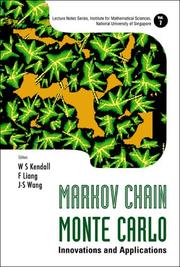
ISBN: 9789812564276 9812564276 9812700919 9789812700919 1281881139 9781281881137 9786611881139 6611881131 Year: 2005 Publisher: Singapore ; Hackensack, NJ : World Scientific,
Abstract | Keywords | Export | Availability | Bookmark
 Loading...
Loading...Choose an application
- Reference Manager
- EndNote
- RefWorks (Direct export to RefWorks)
Markov Chain Monte Carlo (MCMC) originated in statistical physics, but has spilled over into various application areas, leading to a corresponding variety of techniques and methods. That variety stimulates new ideas and developments from many different places, and there is much to be gained from cross-fertilization. This book presents five expository essays by leaders in the field, drawing from perspectives in physics, statistics and genetics, and showing how different aspects of MCMC come to the fore in different contexts. The essays derive from tutorial lectures at an interdisciplinary progr
Monte Carlo method --- Bayesian statistical decision theory --- Markov processes --- Monte-Carlo, Méthode de --- Statistique bayésienne --- Markov, Processus de --- Monte Carlo method. --- Bayesian statistical decision theory. --- Markov processes. --- Simulatiemodellen. --- Analysis, Markov --- Chains, Markov --- Markoff processes --- Markov analysis --- Markov chains --- Markov models --- Models, Markov --- Processes, Markov --- Stochastic processes --- Bayes' solution --- Bayesian analysis --- Statistical decision --- Artificial sampling --- Model sampling --- Monte Carlo simulation --- Monte Carlo simulation method --- Stochastic sampling --- Games of chance (Mathematics) --- Mathematical models --- Numerical analysis --- Numerical calculations --- Markov-processen. --- Monte Carlo-methode.
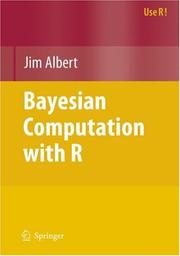
ISBN: 0387713859 0387713840 9780387713847 9780387713854 Year: 2009 Publisher: New York, New York : Springer,
Abstract | Keywords | Export | Availability | Bookmark
 Loading...
Loading...Choose an application
- Reference Manager
- EndNote
- RefWorks (Direct export to RefWorks)
There has been a dramatic growth in the development and application of Bayesian inferential methods. Some of this growth is due to the availability of powerful simulation-based algorithms to summarize posterior distributions. There has been also a growing interest in the use of the system R for statistical analyses. R's open source nature, free availability, and large number of contributor packages have made R the software of choice for many statisticians in education and industry. Bayesian Computation with R introduces Bayesian modeling by the use of computation using the R language. The early chapters present the basic tenets of Bayesian thinking by use of familiar one and two-parameter inferential problems. Bayesian computational methods such as Laplace's method, rejection sampling, and the SIR algorithm are illustrated in the context of a random effects model. The construction and implementation of Markov Chain Monte Carlo (MCMC) methods is introduced. These simulation-based algorithms are implemented for a variety of Bayesian applications such as normal and binary response regression, hierarchical modeling, order-restricted inference, and robust modeling. Algorithms written in R are used to develop Bayesian tests and assess Bayesian models by use of the posterior predictive distribution. The use of R to interface with WinBUGS, a popular MCMC computing language, is described with several illustrative examples. This book is a suitable companion book for an introductory course on Bayesian methods and is valuable to the statistical practitioner who wishes to learn more about the R language and Bayesian methodology. The LearnBayes package, written by the author and available from the CRAN website, contains all of the R functions described in the book. Jim Albert is Professor of Statistics at Bowling Green State University. He is Fellow of the American Statistical Association and is past editor of The American Statistician. His books include Ordinal Data Modeling (with Val Johnson), Workshop Statistics: Discovery with Data, A Bayesian Approach (with Allan Rossman), and Bayesian Computation using Minitab.
Bayesian statistical decision theory --- R (Computer program language) --- Data processing. --- GNU-S (Computer program language) --- Domain-specific programming languages --- Bayes' solution --- Bayesian analysis --- Statistical decision --- Mathematical statistics. --- Computer simulation. --- Computer science --- Visualization. --- Mathematical optimization. --- Statistics and Computing/Statistics Programs. --- Simulation and Modeling. --- Computational Mathematics and Numerical Analysis. --- Optimization. --- Mathematics. --- Optimization (Mathematics) --- Optimization techniques --- Optimization theory --- Systems optimization --- Mathematical analysis --- Maxima and minima --- Operations research --- Simulation methods --- System analysis --- Visualisation --- Imagination --- Visual perception --- Imagery (Psychology) --- Computer mathematics --- Discrete mathematics --- Electronic data processing --- Computer modeling --- Computer models --- Modeling, Computer --- Models, Computer --- Simulation, Computer --- Electromechanical analogies --- Mathematical models --- Model-integrated computing --- Mathematics --- Statistical inference --- Statistics, Mathematical --- Statistics --- Probabilities --- Sampling (Statistics) --- Statistical methods --- Statistique bayésienne --- Statistique mathematique --- Methodes numeriques --- Programmes informatiques --- Mathematical statistics --- Programming --- Data processing
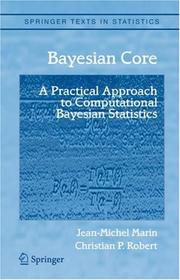
ISBN: 0387389830 0387389792 1441922865 9780387389790 9780387389837 Year: 2007 Publisher: New York : Springer,
Abstract | Keywords | Export | Availability | Bookmark
 Loading...
Loading...Choose an application
- Reference Manager
- EndNote
- RefWorks (Direct export to RefWorks)
This Bayesian modeling book is intended for practitioners and applied statisticians looking for a self-contained entry to computational Bayesian statistics. Focusing on standard statistical models and backed up by discussed real datasets available from the book website, it provides an operational methodology for conducting Bayesian inference, rather than focusing on its theoretical justifications. Special attention is paid to the derivation of prior distributions in each case and specific reference solutions are given for each of the models. Similarly, computational details are worked out to lead the reader towards an effective programming of the methods given in the book. While R programs are provided on the book website and R hints are given in the computational sections of the book, The Bayesian Core requires no knowledge of the R language and it can be read and used with any other programming language. The Bayesian Core can be used as a textbook at both undergraduate and graduate levels, as exemplified by courses given at Université Paris Dauphine (France), University of Canterbury (New Zealand), and University of British Columbia (Canada). It serves as a unique textbook for a service course for scientists aiming at analyzing data the Bayesian way as well as an introductory course on Bayesian statistics. The prerequisites for the book are a basic knowledge of probability theory and of statistics. Methodological and data-based exercises are included within the main text and students are expected to solve them as they read the book. Those exercises can obviously serve as assignments, as was done in the above courses. Datasets, R codes and course slides all are available on the book website. Jean-Michel Marin is currently senior researcher at INRIA, the French Computer Science research institute, and located at Université Paris-Sud, Orsay. He has previously been Assistant Professor at Université Paris Dauphine for four years. He has written numerous papers on Bayesian methodology and computing, and is currently a member of the council of the French Statistical Society. Christian Robert is Professor of Statistics at Université Paris Dauphine and Head of the Statistics Research Laboratory at CREST-INSEE, Paris. He has written over a hundred papers on Bayesian Statistics and computational methods and is the author or co-author of seven books on those topics, including The Bayesian Choice (Springer, 2001), winner of the ISBA DeGroot Prize in 2004. He is a Fellow and member of the council of the Institute of Mathematical Statistics, and a Fellow and member of the research committee of the Royal Statistical Society. He is currently co-editor of the Journal of the Royal Statistical Society, Series B, after taking part in the editorial boards of the Journal of the American Statistical Society, the Annals of Statistics, Statistical Science, and Bayesian Analysis. He is also the winner of the Young Statistician prize of the Paris Statistical Society in 1996 and a recipient of an Erskine Fellowship from the University of Canterbury (NZ) in 2006.
Mathematics. --- Mathematical statistics. --- Computer simulation. --- Computer mathematics. --- Probabilities. --- Statistics. --- Computational intelligence. --- Probability Theory and Stochastic Processes. --- Statistical Theory and Methods. --- Probability and Statistics in Computer Science. --- Simulation and Modeling. --- Computational Intelligence. --- Computational Mathematics and Numerical Analysis. --- Intelligence, Computational --- Artificial intelligence --- Soft computing --- Statistical analysis --- Statistical data --- Statistical methods --- Statistical science --- Mathematics --- Econometrics --- Probability --- Statistical inference --- Combinations --- Chance --- Least squares --- Mathematical statistics --- Risk --- Computer mathematics --- Discrete mathematics --- Electronic data processing --- Computer modeling --- Computer models --- Modeling, Computer --- Models, Computer --- Simulation, Computer --- Electromechanical analogies --- Mathematical models --- Simulation methods --- Model-integrated computing --- Statistics, Mathematical --- Statistics --- Probabilities --- Sampling (Statistics) --- Math --- Science --- Bayesian statistical decision theory --- Bayes' solution --- Bayesian analysis --- Statistical decision --- Distribution (Probability theory. --- Computer science. --- Engineering. --- Computer science --- Distribution functions --- Frequency distribution --- Characteristic functions --- Construction --- Industrial arts --- Technology --- Informatics --- Statistics . --- regressie-analyse --- wiskundige statistiek --- R (Computer program language). --- Statistique bayésienne --- GNU-S (Computer program language) --- Domain-specific programming languages --- Bayesian statistical decision theory - Textbooks --- Statistique mathematique --- Methodes numeriques --- Programmes informatiques
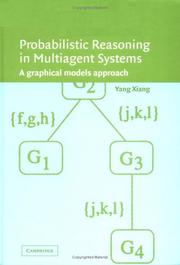
ISBN: 0521813085 0511020740 0521153905 9786610434039 0511177720 0511148127 0511305168 0511546939 1280434031 0511045441 9780511020742 9780511045448 9780521813082 9780511148125 9780511546938 9781280434037 9780521153904 1107133157 9781107133150 6610434034 9780511177729 9780511305160 Year: 2002 Publisher: Cambridge : Cambridge University Press,
Abstract | Keywords | Export | Availability | Bookmark
 Loading...
Loading...Choose an application
- Reference Manager
- EndNote
- RefWorks (Direct export to RefWorks)
This 2002 book investigates the opportunities in building intelligent decision support systems offered by multi-agent distributed probabilistic reasoning. Probabilistic reasoning with graphical models, also known as Bayesian networks or belief networks, has become increasingly an active field of research and practice in artificial intelligence, operations research and statistics. The success of this technique in modeling intelligent decision support systems under the centralized and single-agent paradigm has been striking. Yang Xiang extends graphical dependence models to the distributed and multi-agent paradigm. He identifies the major technical challenges involved in such an endeavor and presents the results. The framework developed in the book allows distributed representation of uncertain knowledge on a large and complex environment embedded in multiple cooperative agents, and effective, exact and distributed probabilistic inference.
Distributed artificial intelligence --- Bayesian statistical decision theory --- Intelligent agents (Computer software) --- Intelligence artificielle répartie --- Statistique bayésienne --- Agents intelligents (logiciels) --- Data processing --- Informatique --- Information Technology --- Computer Science (Hardware & Networks) --- Distributed artificial intelligence. --- Intelligent agents (Computer software). --- Computer Science --- Engineering & Applied Sciences --- Data processing. --- Intelligence artificielle répartie --- Statistique bayésienne --- Agents, Autonomous (Computer software) --- Agents, Cognitive (Computer software) --- Agents, Intelligent (Computer software) --- Assistants, Cognitive (Computer software) --- Assistants, Intelligent software --- Autonomous agents (Computer software) --- Cognitive agents (Computer software) --- Cognitive assistants (Computer software) --- IAs (Computer software) --- Intelligent agent software --- Intelligent software agents --- Intelligent software assistants --- Software agents (Computer software) --- Special agents (Computer software) --- Bayes' solution --- Bayesian analysis --- DAI (Artificial intelligence) --- Distributed AI (Artificial intelligence) --- Artificial intelligence --- Statistical decision --- Computer programs --- E-books --- Multiagent systems. --- Agent-based model (Computer software) --- MASs (Multiagent systems) --- Multi-agent systems --- Systems, Multiagent
Book
ISBN: 9780387924076 9781441928283 9780387922997 0387922997 0387924078 9786612236631 1282236636 Year: 2009 Publisher: New York, N.Y. : Springer,
Abstract | Keywords | Export | Availability | Bookmark
 Loading...
Loading...Choose an application
- Reference Manager
- EndNote
- RefWorks (Direct export to RefWorks)
This book provides a compact self-contained introduction to the theory and application of Bayesian statistical methods. The book is accessible to readers having a basic familiarity with probability, yet allows more advanced readers to quickly grasp the principles underlying Bayesian theory and methods. The examples and computer code allow the reader to understand and implement basic Bayesian data analyses using standard statistical models and to extend the standard models to specialized data analysis situations. The book begins with fundamental notions such as probability, exchangeability and Bayes' rule, and ends with modern topics such as variable selection in regression, generalized linear mixed effects models, and semiparametric copula estimation. Numerous examples from the social, biological and physical sciences show how to implement these methodologies in practice. Monte Carlo summaries of posterior distributions play an important role in Bayesian data analysis. The open-source R statistical computing environment provides sufficient functionality to make Monte Carlo estimation very easy for a large number of statistical models and example R-code is provided throughout the text. Much of the example code can be run ``as is'' in R, and essentially all of it can be run after downloading the relevant datasets from the companion website for this book. Peter Hoff is an Associate Professor of Statistics and Biostatistics at the University of Washington. He has developed a variety of Bayesian methods for multivariate data, including covariance and copula estimation, cluster analysis, mixture modeling and social network analysis. He is on the editorial board of the Annals of Applied Statistics.
informatietechnologie --- methodologieën --- database management --- Information systems --- Social sciences (general) --- Operational research. Game theory --- statistisch onderzoek --- speltheorie --- econometrie --- operationeel onderzoek --- sociale wetenschappen --- Quantitative methods (economics) --- Statistical science --- stochastische analyse --- Distribution (Probability theory. --- Mathematical statistics. --- Social sciences --- Computer science. --- Econometrics. --- Methodology. --- Probability Theory and Stochastic Processes. --- Operations Research, Management Science. --- Statistical Theory and Methods. --- Methodology of the Social Sciences. --- Probability and Statistics in Computer Science. --- Mathematics --- Statistical inference --- Statistics, Mathematical --- Statistics --- Probabilities --- Sampling (Statistics) --- Distribution functions --- Frequency distribution --- Characteristic functions --- Economics, Mathematical --- Informatics --- Science --- Statistical methods --- Bayesian statistical decision theory --- Data analysis --- Bayesian statistical decision theory. --- Statistical methods. --- Mathematical statistics --- Programming --- Probabilities. --- Operations research. --- Management science. --- Statistics . --- Social sciences. --- Behavioral sciences --- Human sciences --- Sciences, Social --- Social science --- Social studies --- Civilization --- Statistical analysis --- Statistical data --- Econometrics --- Quantitative business analysis --- Management --- Problem solving --- Operations research --- Statistical decision --- Operational analysis --- Operational research --- Industrial engineering --- Management science --- Research --- System theory --- Probability --- Combinations --- Chance --- Least squares --- Risk --- Statistique bayésienne --- Social sciences - Statistical methods
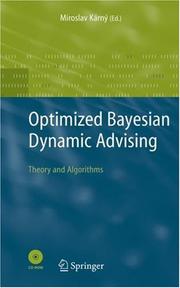
ISBN: 9781852339289 1852339284 1447156757 9786610346929 1280346922 1846282543 Year: 2006 Publisher: London : Springer London : Imprint: Springer,
Abstract | Keywords | Export | Availability | Bookmark
 Loading...
Loading...Choose an application
- Reference Manager
- EndNote
- RefWorks (Direct export to RefWorks)
Written by one of the world’s leading groups in the area of Bayesian identification, control and decision making, this book provides the theoretical and algorithmic basis of optimized probabilistic advising. Starting from abstract ideas and formulations, and culminating in detailed algorithms, Optimized Bayesian Dynamic Advising comprises a unified treatment of an important problem of the design of advisory systems supporting supervisors of complex processes. It introduces the theoretical and algorithmic basis of developed advising, relying on novel and powerful combination black-box modeling by dynamic mixture models and fully probabilistic dynamic optimization. The proposed non-standard problem formulation and its solution mark a significant contribution to the design of anthropocentric automation systems. Written for a broad audience, including developers of algorithms and application engineers, researchers, lecturers and postgraduates, this book can be used as a reference tool, and an advanced text on Bayesian dynamic decision making.
Bayesian statistical decision theory. --- Statistique bayésienne --- Bayesian statistical decision theory --- Mathematics --- Engineering & Applied Sciences --- Physical Sciences & Mathematics --- Mathematical Statistics --- Computer Science --- Statistical decision. --- Statistique bayésienne --- EPUB-LIV-FT LIVINFOR SPRINGER-B --- Decision problems --- Bayes' solution --- Bayesian analysis --- Computer science. --- Computers. --- User interfaces (Computer systems). --- Artificial intelligence. --- Computer simulation. --- Pattern recognition. --- Statistics. --- Computer Science. --- Models and Principles. --- User Interfaces and Human Computer Interaction. --- Artificial Intelligence (incl. Robotics). --- Simulation and Modeling. --- Pattern Recognition. --- Statistics and Computing/Statistics Programs. --- Statistical analysis --- Statistical data --- Statistical methods --- Statistical science --- Econometrics --- Design perception --- Pattern recognition --- Form perception --- Perception --- Figure-ground perception --- Computer modeling --- Computer models --- Modeling, Computer --- Models, Computer --- Simulation, Computer --- Electromechanical analogies --- Mathematical models --- Simulation methods --- Model-integrated computing --- AI (Artificial intelligence) --- Artificial thinking --- Electronic brains --- Intellectronics --- Intelligence, Artificial --- Intelligent machines --- Machine intelligence --- Thinking, Artificial --- Bionics --- Cognitive science --- Digital computer simulation --- Electronic data processing --- Logic machines --- Machine theory --- Self-organizing systems --- Fifth generation computers --- Neural computers --- Interfaces, User (Computer systems) --- Human-machine systems --- Human-computer interaction --- Automatic computers --- Automatic data processors --- Computer hardware --- Computing machines (Computers) --- Electronic calculating-machines --- Electronic computers --- Hardware, Computer --- Computer systems --- Cybernetics --- Calculators --- Cyberspace --- Informatics --- Science --- Game theory --- Operations research --- Statistics --- Management science --- Statistical decision --- Optical pattern recognition. --- Mathematical statistics. --- Artificial Intelligence. --- Statistical inference --- Statistics, Mathematical --- Probabilities --- Sampling (Statistics) --- Optical data processing --- Pattern perception --- Perceptrons --- Visual discrimination --- Statistics .
| Listing 1 - 10 of 12 | << page >> |
Sort by
|

 Search
Search Feedback
Feedback About
About Help
Help News
News